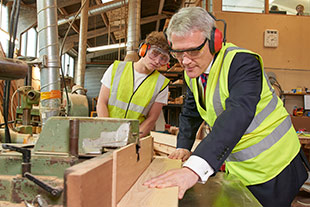Communication is one of the most important issues in the workplace. Good communication is the key to a successful business because it helps everyone to feel heard and engaged at every level. As a result, everyone benefits from a positive, encouraging and successful environment. Here are four ways that companies can boost communication through office design. Design Seating with Collaboration in Mind Open-plan offices help with communication and the flow of ideas amongst employees. This is particularly true when senior staff are part of the open floor plan since it helps all staff tune in to the office vibe and makes teams more cohesive. It also makes people seem more approachable and arrangements like cluster desks and bench seating where people face each other can help with collaboration. However, some staff don’t appreciate the lack of privacy and the open plan layout can be seen as intrusive by more introverted employees, leading to a reduction in concentration. In this case, it’s a good idea to create some separate private spaces for quiet work or adopt a policy for allowing people to work from home when they need to work undisturbed. Online collaboration platforms like Slack, Trello and Basecamp are good at keeping teams connected and up to date with projects. Allocate a Dedicated Communication Area A special area dedicated to teamwork doesn’t necessarily have to be within the confines of a meeting room. It could be an island or shared table in an open-plan office, independent of the normal work environment, yet centrally placed and defined as a ‘communication lounge’ for brainstorming, informal team meetings and project coordination. High padded seating, shelving units or moveable partitions can create an effective acoustic barrier if necessary. Synergy Vision, a medical Communications agency, installed breakout spaces in their new premises when they relocated. The padded and cushioned seats are part of the open plan seating area but high-backed and enclosed to create privacy. Consider Every Space a Workspace In modern offices, hallways and staircases can function as extensions of the workspace. Studies have shown that people are more innovative and open to ideas when in motion. This means effort should be put into the design of every single space, particularly hallways and landings where employees can think from a fresh perspective away from their desks. They can have chance meetings, allowing them the welcome opportunity for face-to-face contact with colleagues, which can create more of a bond as well as aiding inter-team communication. Hallways are being made wider and furnished with sofas, whiteboards and other places to encourage conversation. EDC, a communications group, moved six creative businesses under one roof in London’s West End. A new structural opening and new staircase were constructed between the two floors to allow the companies to easily come together around the central meeting areas and meeting rooms. The interior designers gave the space a shabby chic vibe and created lots of inspiring breakout areas in the walkways and open spaces. Embrace New Technology Phones are becoming a thing of the past in the office as we now rely more heavily on digital technology. Work is becoming more collaborative and video-conferencing from a variety of locations around the world is the main way to communicate between international offices. Encourage this by setting up the best facilities you can for your staff and make it easy for them to communicate by providing the best Wi-Fi connection, webcams and other amenities. Companies are now adding nooks and crannies with seats and a place to plug in and charge your smartphone where filing cabinets would have existed before. Helix Property fitted a bespoke new seating area that included wireless charging points. Verisk Analytics installed a comprehensive audio visual system including interactive screens with full laptop connectivity. This was complemented by meeting rooms fitted with a room booking system to allow for a simple and efficient procedure to managing meetings between teams. Their Training Room provided an interactive whiteboard and repeater screens to cater for the larger open planned teaching area. As you can see, wireless connectivity enables staff to work anywhere, giving them an excellent way to change their scenery and have impromptu meetings using a laptop. This is aided by an increasing emphasis on digital storage and online collaboration, as well as interior design that complements these trends and boosts workplace communication.





